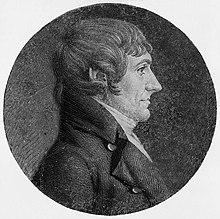William Plumer
| William Plumer | |
|---|---|
 |
|
|
United States Senator from New Hampshire |
|
|
In office June 17, 1802 – March 3, 1807 |
|
| Preceded by | James Sheafe |
| Succeeded by | Nahum Parker |
| 7th Governor of New Hampshire | |
|
In office June 5, 1812 – June 3, 1813 |
|
| Preceded by | John Langdon |
| Succeeded by | John T. Gilman |
|
In office June 6, 1816 – June 3, 1819 |
|
| Preceded by | John T. Gilman |
| Succeeded by | Samuel Bell |
| Member of the New Hampshire House of Representatives | |
|
In office 1788 1790–1791 1797–1800 |
|
| Personal details | |
| Born |
June 25, 1759 Newburyport, Massachusetts |
| Died | December 22, 1850 (aged 91) Epping, New Hampshire |
| Political party | Democratic-Republican |
| Other political affiliations |
Federalist |
| Spouse(s) | Sarah Fowler Plumer (1762–1852) |
| Children | William Plumer, Jr. |
| Residence | Epping, New Hampshire |
| Alma mater | Newburyport South Writing School |
| Profession | Attorney |
| Religion | Baptist |
William Plumer (June 25, 1759 – December 22, 1850) was an American lawyer and Baptist lay preacher from Epping, New Hampshire. Born in 1759 in Newburyport, Massachusetts, he represented New Hampshire as a Federalist in the United States Senate from June 17, 1802 to March 3, 1807. Plumer later became a Democratic-Republican and served as Governor of New Hampshire, 1812–1813 and 1816–1819. He also served in the New Hampshire House of Representatives.
In the 1820 presidential election, he cast the only dissenting vote in the Electoral College against incumbent President James Monroe, voting instead for John Quincy Adams. While some accounts say that this was to ensure that George Washington remained the only American president unanimously chosen by the Electoral College, others assert that he was instead calling attention to his friend Adams as a potential future presidential candidate, or protesting against the "wasteful extravagance" of the Monroe Administration. Plumer also eschewed voting for Daniel D. Tompkins for Vice President as "grossly intemperate" and having "not that weight of character which his office requires," and also "because he grossly neglected his duty" in his "only" official role as president of the Senate by being "absent nearly three-fourths of the time." Plumer instead voted for Richard Rush.
In 1803, Plumer was one of several New England Federalists who proposed secession from the United States due to lack of support for Federalists, rising influence of Jeffersonian Democrats and the diminished influence of the North due to the Louisiana Purchase. Recalling his involvement in the secession scheme in 1827, Plumer said, "This was, I think, the greatest political error of my life: & would, had it been reduced to practise [sic], instead of releiving [sic], destroyed New England....Fortunately for my own reputation the erroneous opinion I formed produced no bitter fruits to myself or my country."
...
Wikipedia
